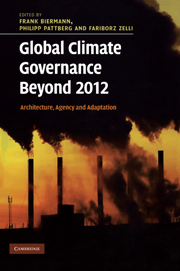Book contents
- Frontmatter
- Contents
- List of contributors
- Preface
- List of abbreviations
- 1 Global climate governance beyond 2012
- Part I Architecture
- Part II Agency
- Part III Adaptation
- 14 Global adaptation governance
- 15 Costs, benefits and interlinkages between adaptation and mitigation
- 16 Global adaptation governance
- 17 Global adaptation governance beyond 2012
- 18 Shaping future adaptation governance
- 19 Conclusions
- Index
- References
19 - Conclusions
options for effective climate governance beyond 2012
Published online by Cambridge University Press: 05 July 2014
- Frontmatter
- Contents
- List of contributors
- Preface
- List of abbreviations
- 1 Global climate governance beyond 2012
- Part I Architecture
- Part II Agency
- Part III Adaptation
- 14 Global adaptation governance
- 15 Costs, benefits and interlinkages between adaptation and mitigation
- 16 Global adaptation governance
- 17 Global adaptation governance beyond 2012
- 18 Shaping future adaptation governance
- 19 Conclusions
- Index
- References
Summary
Introduction
The diversity of the contributions to this volume illustrates the complexity of the challenge. Climate change is a governance problem that needs to be analysed, and addressed, at multiple levels, in multiple sectors, and with a view to multiple actors. In searching for policy options that go beyond current negotiations, the contributions thus addressed issues as diverse as international carbon markets, overlaps between the climate convention and world trade law, the role of non-state actors in technological change, climate refugees, or the vulnerability of the poorest of the poor. The chapters approached these issues from a variety of methodological approaches, showing that the governance challenge of global climate change can be framed very differently.
In light of this complexity, this book did not seek to present a silver bullet for future climate governance. An all-inclusive and perfectly coherent account of policy options would be neither feasible nor would it be desirable given the diversity of interests, perspectives and issues. As Einstein reportedly advised, it is important to simplify a problem to the extent possible – but not more. Instead of applying a structural straitjacket, this book thus offers a broad array of policy options organized under the three research themes of architecture, agency and adaptation. We summarize these options now in Sections 19.2–19.4. Finally, in Section 19.5 we map the policy options according to their political dimensions and institutional settings, illustrating their differences but also the opportunities for joint negotiation and implementation.
- Type
- Chapter
- Information
- Global Climate Governance Beyond 2012Architecture, Agency and Adaptation, pp. 306 - 323Publisher: Cambridge University PressPrint publication year: 2010



